高中英语牛津译林版高一上册模块1 Unit 1 School life Grammar课件
文档属性
| 名称 | 高中英语牛津译林版高一上册模块1 Unit 1 School life Grammar课件 |
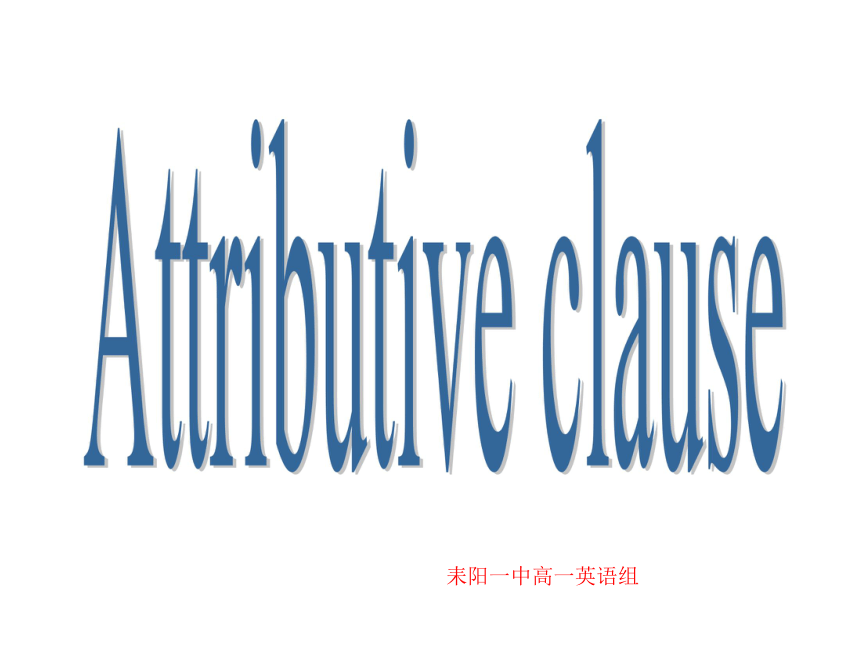
|
|
| 格式 | zip | ||
| 文件大小 | 2.6MB | ||
| 资源类型 | 教案 | ||
| 版本资源 | 牛津译林版 | ||
| 科目 | 英语 | ||
| 更新时间 | 2018-03-08 00:00:00 | ||
图片预览

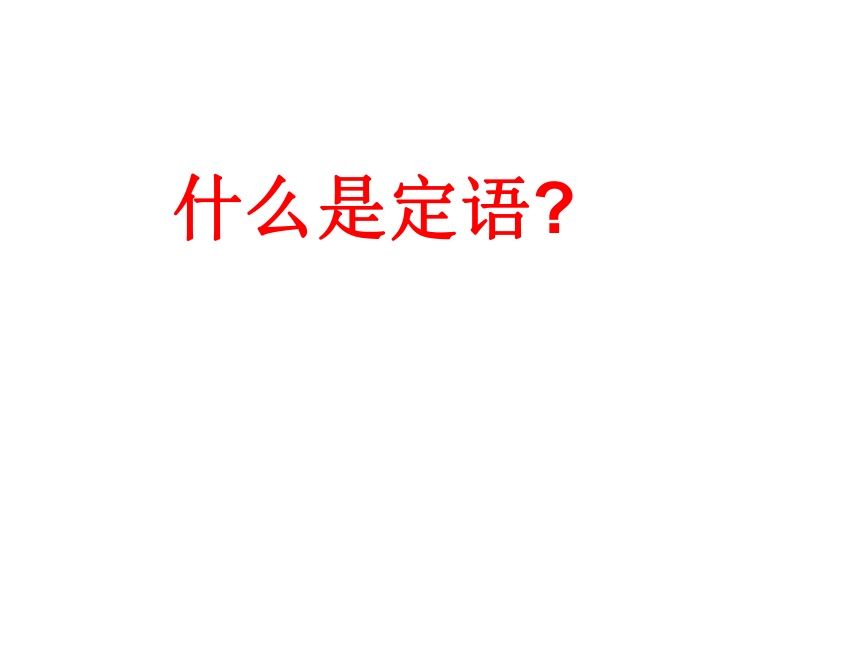



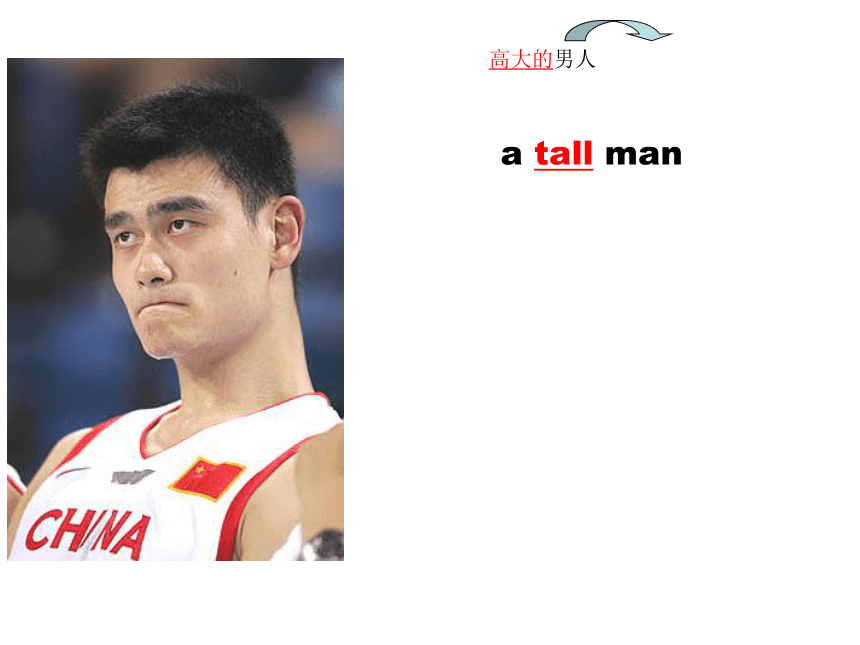
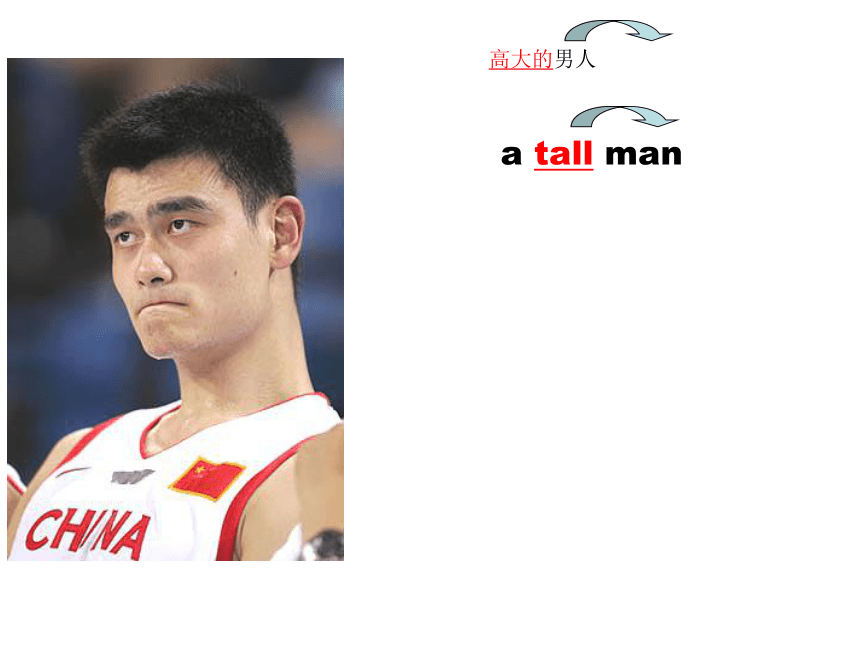



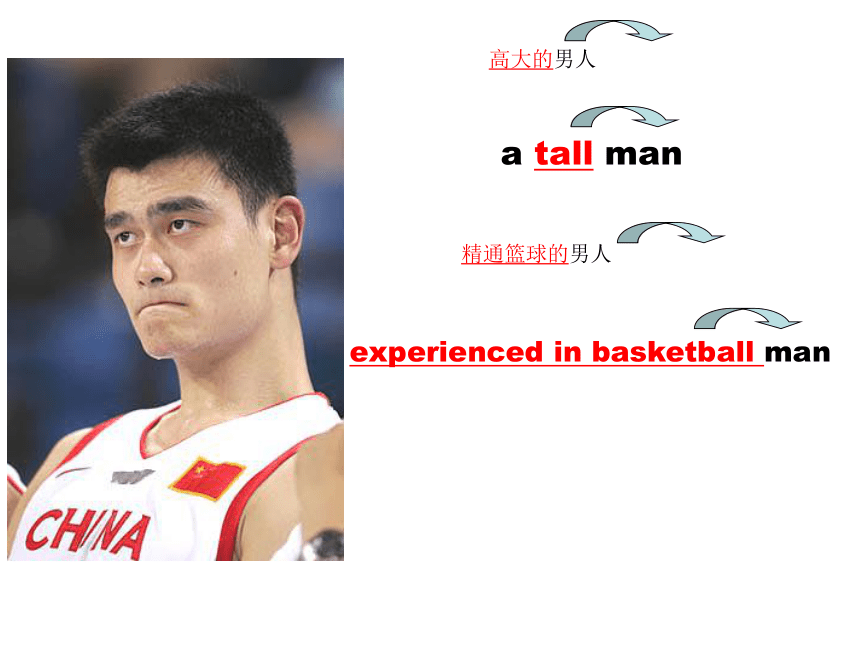

文档简介
(共45张PPT)
耒阳一中高一英语组
什么是定语
高大的男人
高大的男人
a tall man
高大的男人
a tall man
高大的男人
a tall man
高大的男人
精通篮球的男人
a tall man
高大的男人
精通篮球的男人
a tall man
experienced in basketball man
高大的男人
精通篮球的男人
a tall man
experienced in basketball man
高大的男人
精通篮球的男人
a tall man
experienced in basketball man
×
高大的男人
精通篮球的男人
a tall man
experienced in basketball man
×
a man experienced in basketball
高大的男人
精通篮球的男人
a tall man
experienced in basketball man
×
a man experienced in basketball
高大的男人
精通篮球的男人
a tall man
experienced in basketball man
×
a man experienced in basketball
Attribute(定语)
高大的男人
精通篮球的男人
高大的精通篮球的男人
高大的精通篮球的男人
a tall man experienced in basketball
高大的精通篮球的男人
a tall man experienced in basketball
高大的精通篮球的男人
a tall man experienced in basketball
高大的精通篮球的男人
a tall man experienced in basketball
Attribute(定语)
高大的精通篮球的男人
什么是定语
用来修饰名词或代词的单词、短语或句子。
1. What’s your name, please
2. We have seven lessons a day.
3. The black pen is hers.
4. People there like sports.
5. She likes oranges imported from the USA.
6. Have you seen the book on the desk
7.The boy playing over there is my brother.
指出下列句子中的定语
1. I loved the lessons that he gave in English literature.
2.All my classmates were fond of the cake that I made.
3. In the Art class that I took, I made a small sculpture.
什么是定语从句?
在英语中, 修饰或限制一个名词或代词的从句就叫定语从句。
相关概念:
先行词:定语从句所修饰的名词或代词。
关系词:连接定语从句和主句,并在定语从句中代替先行词充当成分(主语、宾语、表语、定语以及状语)的词。
In the attributive clauses the relative words usually function as the:
subject, object, predicative, attribute, adverbial.
Functions
The trees are behind the office building.
They have lost their leaves.
Subject
The trees which are behind the office building have lost their leaves.
The man is kind.
Everyone likes him.
The man (who) everyone likes is kind.
Object
Jack used to be a lazy boy.
He is no longer a lazy boy.
Jack is no longer the lazy boy that he used to be.
Predicative
She has a brother.
I can’t remember his name.
She has a brother whose name I can’t remember.
Attribute
The school is in Shenzhen.
He studied in the school.
The school where he studied is in Shenzhen.
Adverbial
Read the paragraph in the textbook and underline the attributive clauses you find.
David was one of the most helpful students that we ever had.
In 2004, he went to Oxford University where he became interested in Chinese culture.
Some of the cities in China which he likes most are Beijing, Shanghai, Harbin and Nanjing.
Practice
(P9)
4. Most of the students whom he taught have become his friends.
5. Some of the books were gifts that he got from his Chinese friends and students.
6. The paintings that David donated to the school are being shown in the exhibition room.
主语
宾语
可省略
定语
状语
指人
who
that
whom
that
whose
指物
which
that
which
that
whose
关系词的作用
关系代词:
1. who指人,作主语或宾语
who (whom)
The professor who visited our school yesterday is from Canada.
2. whom指人,作宾语
The man (whom/who) I talked to just now is Mr. Li.
用法
visited our school yesterday
I talked to just now
3. which 指物,作主语或宾语
These are the trees which were planted last year.
The radio (which) he is using is made in Japan.
Is this the library (which) you borrow books from
用法
were planted last year
he is using
you borrow books from
4. that 指人/物,作主语或宾语 (作宾语可省略)
A plane is a machine. It can fly.
A plane is a machine that can fly.
He is the man. I told you about him.
He is the man (that) I told you about.
用法
5.whose 在定语从句中作定语,表示引导词
与 whose 后的名词为所属关系。 whose
多指人,也可指物,指物时可与 of which (the) 互换使用。
This is the book whose cover is blue.
用法
This is the book. The cover of the book is blue.
关系词
关系代词
关系副词
that, which (先行词指物时)
that, who (先行词指人时)
that (先行词指“人+物”时)
when 时间:状语
where 地点;状语
why 原因;状语
(在从句中做主、宾、表)
(在从句中做主、宾、表)
(在从句中做主、宾、表)
关系限定词
whose 在从句中限定另一名词
关系词的分类:
The noodles that I cooked were delicious.
They planted the trees which didn’t need much water.
Harry is the boy whose mother is our Maths teacher.
He is not the man whom he used to be.
He went to the school where he studied ten years ago.
划出下列句子中的先行词和定语从句,并指出关系词在从句中充当的成分。
The man _________stands there is Tom.
The girl ____________I met is Ms Li.
The boy ________watch was lost is Tom.
The book _________ lies on the desk is his.
The pen ___________ you bought is good.
The magazine ________cover is red is
nice.
who/that
(whom/that)
whose
which/that
(which/that)
whose
Exercise :
that和which在指物的情况下一般都可以互换, 但在下列情况下, 一般用that而不用which。
I am sure she has nothing that you can borrow.
I’ve read every book that is borrowed from the library.
This is the first book that he has read.
This is the most interesting book that I have ever read.
This is the very book that belongs to him.
(1) 先行词为all, everything, nothing, anything, little,
much 等不定代词时。
(2)先行词被all, every, no, some, any, little, much等修饰时。
(3)先行词被序数词或形容词最高级修饰时。
(4)先行词被the only, the very, the same, the last 等修饰时。
I’ve read all the books that are about this matter.
(5 )先行词中既有人,也有物时。
The guests spoke highly of the children and their performances that they saw at the Children’s Palace.
改错
1.Is this the book your father bought it for you
2.Who is the girl you talked with him
3.They are talking about the people and the things which they saw on
their way home.
4.This is the very thing which I can tell you.
5.Is this all what you want to say
6.Who is the man who is speaking to your mother
7. This is the boy his handwriting is the best in our class
8. It was the meeting which importance I didn’t know.
耒阳一中高一英语组
什么是定语
高大的男人
高大的男人
a tall man
高大的男人
a tall man
高大的男人
a tall man
高大的男人
精通篮球的男人
a tall man
高大的男人
精通篮球的男人
a tall man
experienced in basketball man
高大的男人
精通篮球的男人
a tall man
experienced in basketball man
高大的男人
精通篮球的男人
a tall man
experienced in basketball man
×
高大的男人
精通篮球的男人
a tall man
experienced in basketball man
×
a man experienced in basketball
高大的男人
精通篮球的男人
a tall man
experienced in basketball man
×
a man experienced in basketball
高大的男人
精通篮球的男人
a tall man
experienced in basketball man
×
a man experienced in basketball
Attribute(定语)
高大的男人
精通篮球的男人
高大的精通篮球的男人
高大的精通篮球的男人
a tall man experienced in basketball
高大的精通篮球的男人
a tall man experienced in basketball
高大的精通篮球的男人
a tall man experienced in basketball
高大的精通篮球的男人
a tall man experienced in basketball
Attribute(定语)
高大的精通篮球的男人
什么是定语
用来修饰名词或代词的单词、短语或句子。
1. What’s your name, please
2. We have seven lessons a day.
3. The black pen is hers.
4. People there like sports.
5. She likes oranges imported from the USA.
6. Have you seen the book on the desk
7.The boy playing over there is my brother.
指出下列句子中的定语
1. I loved the lessons that he gave in English literature.
2.All my classmates were fond of the cake that I made.
3. In the Art class that I took, I made a small sculpture.
什么是定语从句?
在英语中, 修饰或限制一个名词或代词的从句就叫定语从句。
相关概念:
先行词:定语从句所修饰的名词或代词。
关系词:连接定语从句和主句,并在定语从句中代替先行词充当成分(主语、宾语、表语、定语以及状语)的词。
In the attributive clauses the relative words usually function as the:
subject, object, predicative, attribute, adverbial.
Functions
The trees are behind the office building.
They have lost their leaves.
Subject
The trees which are behind the office building have lost their leaves.
The man is kind.
Everyone likes him.
The man (who) everyone likes is kind.
Object
Jack used to be a lazy boy.
He is no longer a lazy boy.
Jack is no longer the lazy boy that he used to be.
Predicative
She has a brother.
I can’t remember his name.
She has a brother whose name I can’t remember.
Attribute
The school is in Shenzhen.
He studied in the school.
The school where he studied is in Shenzhen.
Adverbial
Read the paragraph in the textbook and underline the attributive clauses you find.
David was one of the most helpful students that we ever had.
In 2004, he went to Oxford University where he became interested in Chinese culture.
Some of the cities in China which he likes most are Beijing, Shanghai, Harbin and Nanjing.
Practice
(P9)
4. Most of the students whom he taught have become his friends.
5. Some of the books were gifts that he got from his Chinese friends and students.
6. The paintings that David donated to the school are being shown in the exhibition room.
主语
宾语
可省略
定语
状语
指人
who
that
whom
that
whose
指物
which
that
which
that
whose
关系词的作用
关系代词:
1. who指人,作主语或宾语
who (whom)
The professor who visited our school yesterday is from Canada.
2. whom指人,作宾语
The man (whom/who) I talked to just now is Mr. Li.
用法
visited our school yesterday
I talked to just now
3. which 指物,作主语或宾语
These are the trees which were planted last year.
The radio (which) he is using is made in Japan.
Is this the library (which) you borrow books from
用法
were planted last year
he is using
you borrow books from
4. that 指人/物,作主语或宾语 (作宾语可省略)
A plane is a machine. It can fly.
A plane is a machine that can fly.
He is the man. I told you about him.
He is the man (that) I told you about.
用法
5.whose 在定语从句中作定语,表示引导词
与 whose 后的名词为所属关系。 whose
多指人,也可指物,指物时可与 of which (the) 互换使用。
This is the book whose cover is blue.
用法
This is the book. The cover of the book is blue.
关系词
关系代词
关系副词
that, which (先行词指物时)
that, who (先行词指人时)
that (先行词指“人+物”时)
when 时间:状语
where 地点;状语
why 原因;状语
(在从句中做主、宾、表)
(在从句中做主、宾、表)
(在从句中做主、宾、表)
关系限定词
whose 在从句中限定另一名词
关系词的分类:
The noodles that I cooked were delicious.
They planted the trees which didn’t need much water.
Harry is the boy whose mother is our Maths teacher.
He is not the man whom he used to be.
He went to the school where he studied ten years ago.
划出下列句子中的先行词和定语从句,并指出关系词在从句中充当的成分。
The man _________stands there is Tom.
The girl ____________I met is Ms Li.
The boy ________watch was lost is Tom.
The book _________ lies on the desk is his.
The pen ___________ you bought is good.
The magazine ________cover is red is
nice.
who/that
(whom/that)
whose
which/that
(which/that)
whose
Exercise :
that和which在指物的情况下一般都可以互换, 但在下列情况下, 一般用that而不用which。
I am sure she has nothing that you can borrow.
I’ve read every book that is borrowed from the library.
This is the first book that he has read.
This is the most interesting book that I have ever read.
This is the very book that belongs to him.
(1) 先行词为all, everything, nothing, anything, little,
much 等不定代词时。
(2)先行词被all, every, no, some, any, little, much等修饰时。
(3)先行词被序数词或形容词最高级修饰时。
(4)先行词被the only, the very, the same, the last 等修饰时。
I’ve read all the books that are about this matter.
(5 )先行词中既有人,也有物时。
The guests spoke highly of the children and their performances that they saw at the Children’s Palace.
改错
1.Is this the book your father bought it for you
2.Who is the girl you talked with him
3.They are talking about the people and the things which they saw on
their way home.
4.This is the very thing which I can tell you.
5.Is this all what you want to say
6.Who is the man who is speaking to your mother
7. This is the boy his handwriting is the best in our class
8. It was the meeting which importance I didn’t know.
